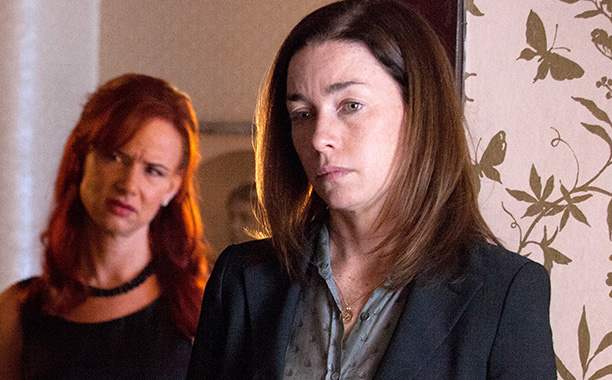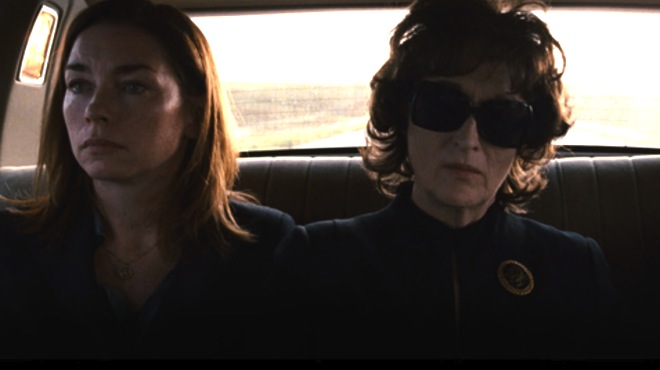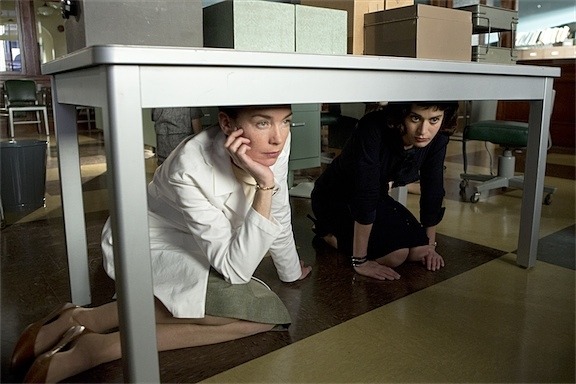Here's Andrew to celebrate the release of last year's embattled August: Osage County newly arrived on DVD. Significant spoilers ahead.

Each year there's at least one film which wins middling to good reviews and manages Oscar nods but is promptly forgotten as soon as it's released. August: Osage County was 2013's victim of that unfortunate annual tradition. Sure, it earned those two acting nominations it seemed assured early on but no one was particularly interested in talking about any aspect of August: Osage County, but for its Oscar belly-flop elsewhere and the Oscar queen at the centre. Perhaps, it was an automated response to Meryl Streep usually being at the centre of films with little else to offer than her star turn (The Iron Lady, Julie & Julia, Music of the Heart, etcetera). It's a shame because the former awards’ hopeful had so much more to celebrate than just the fire-breathing matriarch in the middle.
The strongest asset was undoubtedly that excellent cast. Aside from Streep and Roberts, only a few players picked up significant praise and even then the one most deserving was the one afforded hardly any attention: Julianne Nicholson as middle-child Ivy.

Even back in October/November when there was faint hope the film would be a legitimate contender “in all categories” like those pesky FYC ads kept insisting, Nicholson was never explicitly in the running. Undoubtedly, much of that rests on the fact that middle daughter Ivy, is the least active of the five adult women in the drama despite a hefty amount of screen time. She has the least agency to the point that even when she’s attempting to do things it always seems like she’s the victim of an action and not the aggressor. I've been a steady fan of hers since her stellar work on Dick Wolf's ill-fated 2006 procedural Conviction, but there's no arguing that amidst Oscar winning Streep and Roberts, Emmy winning Martindale, and Oscar nominated Lewis (even Little Miss Sunshine herself Abigail Breslin) Nicholson was the woman with the lowest profile.
It might be disingenuous to say that Nicholson performance ends up being the key to August: Osage County working at all but she is its secret weapon, essential to its success despite a role without legitimate scene-stealing moments, the kind by which so many performances are judged. Nicholson sits beside Roberts as MVP of the movie, but whereas Julia is working with a character that's destined to work if the actor doesn't make a mess of it, Ivy is the sort of role that can easily be wallpaper unexceptional. Nicholson is doing a fantastic job of imbuing a potentially fringe role with the import and effect of what Patron Saint of Supporting Actresses Stinkylulu calls “actressing at the edges”.
There's a scene late in the film where the three sisters have their lone moment in the yard when Ivy reveals her plans to leave the state with her "cousin" Charles. This leads into one of Violet’s key monologues, the boot story. It’s a big moment for Streep, but it’s significant how the reactions of the daughter inform the story. Karen responds most, trying so hard to win her mother’s attention. Barb is uncertain in her feelings but suspicious of an agenda in the telling. It’s Nicholson, on the periphery, that I’m drawn to. She does this almost imperceptible eye roll and then turns to trudge into the house. Even Lett’s in the script for the film points out as the script indicates her departure from the scene, She’s had enough of Violet to last a lifetime. It's a quiet moment which marks the entirety of the performance and a distinct indication of the difference between Ivy on screen and Ivy in the play.
Textually, Ivy can appear as such a flat character I’ve seen her played with a propensity for shrillness maybe to counteract the potential for flatness. Even in the superior Broadway production, Sally Murphy’s Ivy tends to be more strident than tranquil. (Take a look at her in the play’s final scene here.) If the biggest problem of Wells in August: Osage County is that he’s too hands off a director make the work cohesive, he at least directs a cast of excellent performances to make the make the ensemble nature of the piece shine. Ivy’s incestuous dalliance with Little Charles has always had the feeling of being closer to collateral damage than a sincere focal point; more of a 'This family is so screwed, no one is safe' moment than a 'Damn, look at how much this woman is hurting' incident. So Nicholson's moving work is surprising, arguably shifting that film's final moment of tragedy right here, and not the scene immediately thereafter where it usually is when Barb realizes Violet's culpability in her father's death.
Once again Nicholson is an extraneous part of a ferocious scene already in play. Her discovery of Charles' paternity sees her once again as victim. Even when we remember the scene in our minds it is Barb’s recitative “Eat the fish, bitch!” playing in our heads. And as excellently caustic and hilarious as Julia is while trying to prevent the inevitable, it’s disheartening to watch Nicholson playing Ivy's misguided hopefulness heading toward destruction. Ivy is full of sadness and desolation, but her certainty that this (her not at all glamorous move to New York) is the best possibility in her life has you rooting for this unusual case of cinematic incest. There’s a bizarre sort of pride as she repeats to her mother, “Little Charles and I. Little Charles and I.” So, when the “Little Charles is your brother” line comes you haven't the least inclination to be amused, even if Streep's line-reading is a punchline.

The screenplay itself necessitates Ivy driving off after she leaves Barb with merely one line of angry resentment. But the film prolongs the scene, a smart move given Nicholson's excruciating profundity as she exits. It doesn’t feel forced but a natural extension of the underlying theme of broken people trying to reconnect but only hurting each other more. The score swells and as Barb chases behind the car apologising the film’s existence as a tale of sibling relationships destroyed comes to the fore. (I’ve read the play numerous times, I did a second year literature on 21st century dramas with a focus on August, I’ve seen it acted on stage, in parts, live and on the internet but the import of the play as one of sibling tragedy never felt as significant.)
Ivy’s earlier claim that the sisters are just people accidentally connected by genetics seemed truer than any belief that these women were actually really connected. But onscreen, in that final scene, I believed. When Ivy utters, "There's no difference!" equating Barb and Violet's culpability, Nicholson makes us believe with just a line reading that Barb is headed down a dangerous path. But, even more, the actress nails the sense of betrayal that a younger sibling feels when the eldest fails to protect her from a common enemy. It's why the ensuing car chase manages to work as an emotional moment, even if the sibling rapport in the film is at a minimum.
It’s the sort of role, quietly but excellently complementing cinema stars like Roberts and Streep that would in other circumstances win a mass of “breakthrough” accolades. Sure, Nicholson has been acting for more than a decade (she started in 1998, one of her roles that year as a college student in another Streep vehicle One True Thing but breakthrough prizes never care about time served already).I kept wondering just why – even with the film’s lukewarm reception – there were not louder plaudits of Nicholson who was doing such good work in her first main role in a major release. Sheer speculation, but I fear its indictive of the unfortunate state of affairs that after a certain age there’s little chance for actresses not previously lauded, to become so. Jared Leto, the same age as Nicholson, was picking up "Breakthrough" prizes and trophies galore for Dallas Buyers Club.

May some other director helming a major release realize Julianne Nicholson's worth. If John Wells cast her in this otherwise All-Name cast maybe things are looking up? If her upcoming work on James Gray’s series The Red Road succeeds, coupled with her 2013 work on Masters of Sex it could be the push forward that her career deserves and needs. But, so many ifs. Until then, I guess Julianne is destined to remain like poor Ivy - so good, but ever ignored.